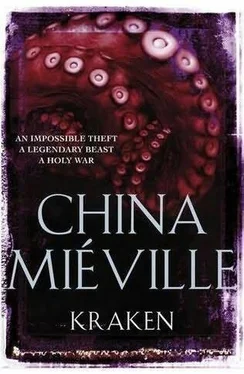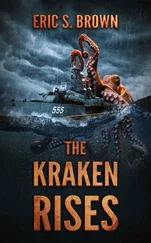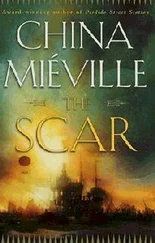No wonder those names had tantalised. He was ashamed of himself. Kubodera and Mori were the researchers who, a few months previously, had been the first researchers to catch the giant squid on camera in the wild.
He downloaded their essay. He looked again at the pictures. “First-ever observations of a live giant squid in the wild” the paper was called, as if ten-year-olds had taken control of the Proceedings of the Royal Society B. First ever.
More than one of his colleagues had printouts of those pictures above their desks. When the images were released, Billy himself had turned up at the office with two bottles of Cava, and had proposed that the anniversary should henceforth be an annual holiday, Squid-day. Because these pictures, as he had said to Leon at the time, were momentous shit.
The first was the most famous, the one they had used on the news. Ajut into view in dark water almost a kilometre down, an eight-metre squid. Its arms blossomed, curved left and right around the bait at the end of the perspectived line. But it was the second picture at which Billy stared.
Again the line descended; again there in ominous water was the animal. But this time it was coming mouth-on. It was caught in a near-perfect radial limb-burst: at the apex, the bite. The two hunting arms, longer limbs with paddle-shaped hands, were recoiled in the dark.
A tentacular explosion. That picture banished all slanderous theories of Architeuthis as sluggish predator-by-accident, tentacles adangle in deepwater lethargy for prey to bumble into, no more a hunter than some idiot jellyfish.
That image had been cherished by fan-partisans of Mesonychoteuthis, the “colossal squid,” Architeuthis’s huge, squat-bodied rival. Which, Mesonychoteuthis, yes, had also been emerging into the camera and video gaze with highly and historically unusual enthusiasm recently. And it was, yes, a terrifying animal. True, it had greater mass; its mantle was longer; granted, its tentacles grabbed not with suckers but with cruel cat-curved claws. But whatever its shape, however its stats and the Architeuthis’s compared, it would never be the giant squid. It was a parvenu monster. Hence the trash-talk of those who researched it, eager to demote the long-term kraken for their new favourite: “without parallel,” “… even larger,” “an order of magnitude meaner.”
But observe the Kubodera/Mori images. Hardly the weak opportunist the haters had dreamed up. Architeuthis did not wait and dangle. Architeuthis loomed, jetted from the abyss, hunting.
Billy stared at the screen. Ten arms, five lines crisscrossing; two longer than the others. The silver design on the pin he’d seen was of this predator incoming. As seen by prey.
HE WALKED THE CORRIDORS CARRYING PAPERS SO HE LOOKED AS IF he was going from somewhere to somewhere else. He entered rooms he was allowed to enter, nodded in greeting to the police guarding those he was not. His revelation notwithstanding, he still had no idea what it was he was hoping to find.
He left the Darwin Centre for the main museum. He saw no police there. He walked the route he used to take as a boy, past the staring ichthyosaur, stone ammonites, past where was now the café. There at last, in the middle of everything and everyone, he thought perhaps he heard a sound. The noise of a jar rolling. Very faint.
It came-or sounded as if it did to him, he corrected himself-from a door off-limits to visitors, that led downstairs to storage areas and undercorridors. He listened at it, crowds to his back. He heard nothing. He entered the keycode and descended.
Billy walked windowless halls underground. He told himself that he did not think he was listening for anything real. That whatever hint it was he was looking for came from inside him. So alright, he said to himself. Help me out. What am I looking for? What are you-what am I-on about?
Guards and curators raised their hands as he passed in brief greetings. The rooms and hallways were lined with industrial shelving, on which were cardboard boxes labelled in thick pen; glass cases empty, or full of surplus specimens; papers; unneeded furniture. There below the heating pipes, by high brick walls and pillars, Billy heard the noise again. From around a corner. He followed it like bread crumbs.
The corridor opened out, not a room but a sudden large hallway. It was stacked quite full of taxidermy, charnel Victoriana. Mammal heads watched from walls, like a hundred Faladas; bisons stiff as aging soldiers by a plaster iguanodon and a tatty emu. There was a thicket of the preserved necks-up of giraffes, their heads a canopy above.
A clink, a clack. Under the striplights the stuffed bodies shed hard shadows. Billy heard another tiny noise. It came from the dark by the wall, deep in the specimen undergrowth.
Billy stepped off the path. He pressed through unyielding antique bodies, shouldering deeper into the little forest of animal remains. He glanced up as if at birds and pressed toward the whitewashed walls. He did not hear another of the sounds, only his own efforts and the brush of his clothes on dry skins. He rounded a stack of hippo parts, and came abruptly up against something of which he could for moments not make sense.
Glass, an old glass container as large as any he had seen. A chest-high lidded cylinder with scalloped base, full of pee-coloured preserver, and a specimen at which he stared. Something rather too big for the container, shoved crudely inside. Part-peeled, with eyes and paws up against the glass and ragged skin suspended like open wings, but even as he thought that he shook his head no.
Billy saw that what he had thought pelt was a ruined shirt, what he had thought peeled was hairlessness and bloat, that oh my Jesus fucking Christ what stared deadly at him in broken pose pressed up and misshaped against the bottle’s inside was a man.
BILLY STAYED OUT OF THE POLICE’S WAY. IT WAS NOT EVEN HIM WHO called them. In those initial terrified moments, when he had torn upstairs unable to breathe, he had not thought to make the call. He had instead run to the two officers guarding the Darwin Centre and screamed, “Quick! Quick!”
Their colleagues came quickly in numbers, cordoning off more of the museum, declaring the basement out of bounds. They took Billy’s prints. Gave him hot chocolate for shock.
No one questioned him. They put him in a conference room and told him not to leave, but no one asked how he had found what he had found. Billy waited by an overhead projector, a TV on a rolling base. He listened to the museum being cleared, the consternation of the crowds.
He wanted solitude more than he wanted fresh air. He wanted his body to stop the last of its panicked shaking, so he sat and waited, as he had been told to, his glasses steaming when he sipped, until the door opened and Baron peered in.
“Mr. Harrow,” Baron said, and shook his head. “Mister Hah-row…
“Mr. Harrow, Billy, Billy Harrow. What have you been up to?”
BARON SAT NEXT TO BILLY AND SHRUGGED AT HIM SYMPATHETICALLY.
“Bit of a shock,” he said.
“What the hell?” Billy said. “What the hell, how did they get that…? What even happened?”
“Gives a whole new meaning to ‘Someone getting bottled,’ doesn’t it? I apologise, I apologise,” Baron said. “Morgue humour. Defence mechanism. You’ve had a horrible shock, I do know. Believe me.”
“What’s going on?” Billy said. Baron said nothing. “I saw Dane,” Billy said.
“Is that right?” Baron said slowly. “Really now?”
“I was coming home. Last night. On a bus. He was on there. He must’ve been following me. Unless he could’ve just… no. He must’ve been there deliberately. It wouldn’t be hard for him to find out where I live…”
Читать дальше











